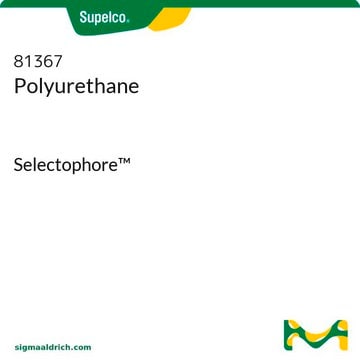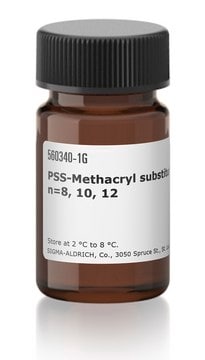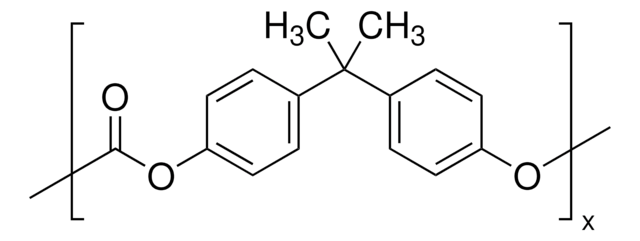182621
Poly(vinyl chloride)
analytical standard, average Mw 85,000 (Typical), average Mn 40,000 (Typical)
Synonym(s):
PVC
Sign Into View Organizational & Contract Pricing
All Photos(1)
About This Item
Linear Formula:
(CH2CHCl)n
CAS Number:
MDL number:
UNSPSC Code:
41116107
PubChem Substance ID:
NACRES:
NA.24
Recommended Products
grade
analytical standard
Quality Level
form
powder
mol wt
average Mn 40,000 (Typical)
average Mw 85,000 (Typical)
technique(s)
gel permeation chromatography (GPC): suitable
density
1.4 g/mL at 25 °C (lit.)
format
neat
SMILES string
ClC=C
InChI
1S/C2H3Cl/c1-2-3/h2H,1H2
InChI key
BZHJMEDXRYGGRV-UHFFFAOYSA-N
Looking for similar products? Visit Product Comparison Guide
General description
Poly(vinyl chloride) [PVC] is a polymer which is mostly prepared from vinyl chloride monomer. In most cases PVC is mixed with heat stabilizers, lubricants, plasticizers, fillers, and other additives.
Application
Labile chlorines of poly (vinyl chloride) was used to perform to graft copolymerize butyl acrylate and 2-ethyl hexyl acrylate using atom transfer radical polymerization method, followed by gel permeation chromatography (GPC) to identify the traces of graft copolymer samples.
Storage Class Code
11 - Combustible Solids
WGK
WGK 3
Flash Point(F)
Not applicable
Flash Point(C)
Not applicable
Personal Protective Equipment
dust mask type N95 (US), Eyeshields, Gloves
Choose from one of the most recent versions:
Already Own This Product?
Find documentation for the products that you have recently purchased in the Document Library.
Customers Also Viewed
Graft copolymerization of butyl acrylate and 2-ethyl hexyl acrylate from labile chlorines of poly (vinyl chloride) by atom transfer radical polymerization.
Bicak, Niyazi, and Mesut Ozlem.
Journal of Polymer Science Part A: Polymer Chemistry, 41.21, 3457-3462 (2003)
Poly (vinyl chloride)
Allsopp, Michael W., and Giovanni Vianello.
Ullmann's Encyclopedia of Industrial Chemistry, 28, 441-468 (1992)
Gianluigi Li Bassi et al.
Critical care medicine, 41(2), 518-526 (2012-12-25)
To assess the structural characteristics involved in the design of high-volume low-pressure endotracheal tube cuffs that are associated with fluid sealing effectiveness and to determine the extent of transmitted tracheal pressures upon cuff inflation. In vitro study. Pneumology laboratories. Eight
Olivier Firmesse et al.
International journal of food microbiology, 159(3), 179-185 (2012-10-31)
The aim of this study was to determine how quickly the surface of a refrigerated supermarket serve over counter becomes loaded with bacteria. New material made of polyvinyl chloride or stainless steel was placed on the surface on which foodstuffs
Yujie Lei et al.
Zhongguo xiu fu chong jian wai ke za zhi = Zhongguo xiufu chongjian waike zazhi = Chinese journal of reparative and reconstructive surgery, 26(9), 1117-1121 (2012-10-13)
To explore the influence of three central venous catheter biomedical materials (polyurethane, silicone, and polyvinyl chloride) on the proliferation, apoptosis, and cell cycle of Xuanwei Lung Cancer-05 (XWLC-05) cells so as to provide the basis for clinical choice of central
Our team of scientists has experience in all areas of research including Life Science, Material Science, Chemical Synthesis, Chromatography, Analytical and many others.
Contact Technical Service






